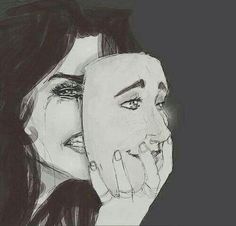By Veronica Emilia Nuzzolo, M.Ed., Ph.D.
Understanding The Self-Defeating Personality
Self-defeating personalities display consistent patterns of detrimental behavior resulting in problematic situations and failed relationships.

These personalities create disappointing environments, become stagnant, and fail to accomplish important life goals. These individuals lack self-esteem, self-awareness, and self-acceptance. They are riddled with guilt and shame, and according to the definition of personality disorder, do have maladaptive processing methods that create problematic patterns of relating, perceiving and behaving. Their behavior does create problems in their daily lives, in their personal relationships, (preferring to stay and suffer in a bad relationship, rather than move forward in a healthy one, or to be alone,) and their off-putting behavior does diminish their ability to function in society. Social interaction is a significant component of any healthy relationship and is imperative when trying to establish relationships at a deeper level. The self-defeating personality, the consummate victim will be a people pleaser, will attempt to be optimistic, will attempt to lovingly commit, and then will wholeheartedly invest in sabotage. Their inability to love or even like themselves often leads to inappropriate choices and related conditions such as substance abuse, eating disorders, and gambling addictions, making any healthy relationship impossible.
Without the appropriate coping mechanisms, the urge to “self-destruct” and “sabotage” will continue to lead to self-defeating behaviors which will certainly lead to failure, personally and professionally. This self-loathing, despicable me, will constantly create a toxic environment that consumes every aspect of life. The behavior will always be counter-productive, and this person will always deny themselves of happiness, contentment, and fulfillment.
Individuals attempting to escape self-defeating, self-destructive, and addictive behaviors require positive non-judgmental social interaction and support. Without such support, it is extremely difficult to make the changes necessary to move forward and live a positive, healthy, and fulfilling life. Understanding the issues, the “triggers” is imperative when attempting to understand the disease. To assist in eradicating these feelings of rejection and disappointment, self-hatred and loathing, one must learn how to control emotion by decreasing anxiety and the sense of reported “nothingness” that ultimately produces an emotional void, a detachment from self, from feeling and loving, and the inconsiderate response to the feelings of others.
Learning is a relatively permanent change in behavior

Grit, personal desire and commitment, and a true understanding of self, is the cornerstone, the motivation of positive progression. Interpersonal awareness is the true understanding of yourself and others. One must want to possess this “inner awareness,” this understanding of self to succeed in achieving self-acceptance.
Social Interpersonal Growth is a learning process, also referred to as social interpersonal learning, or interpersonal psychotherapy, that enables a person to become aware of his or her self, and achieve self-acceptance. Learning to believe in yourself, self-awareness, is the first step toward loving yourself, self-acceptance, or self-actualization. This Humanistic psychological perspective suggests that inner freedom represents the power to choose and direct one’s life. Humanistic theorists contend that finding self and the meaning of life through free will, choice, self-acceptance, and personal responsibility is the intrinsic motivation needed to achieve personal fulfillment.
The Here and Now
The first step in the process is becoming aware. Assessing the past is necessary to improve the future by learning to be aware of emotions that transpire at the thought of any one particular event. Was there a traumatic event, does this event continue to make you anxious, do you think that you did something wrong, do you think that you provoked the situation, or perhaps you believe that you deserved it. Why else would this have happened. Sadly, these beliefs are very common, and to move forward we need to build self-esteem and recapture your dignity and respect. We need to learn and understand that no person provokes or deserves mistreatment, verbally or physically. And, no person should become the consummate victim. Staying in denial, repressing and ignoring the “demon” allows the self-destructive behavior, the mistreatment of self to continue.
Get out of your own way and take control

The second step of the learning processes is ownership, accountability and responsibility, staying aware. Do not become your own obstacle. Do not let your emotions rule you and force you into a life of determinism. When emotions take control, mood takes charge, and you lose control. You must learn to take control by staying aware of your emotions and mood changes. Your are responsible for controlling your behavior. One method of control is journaling. Create a dialogue with your positive self, communication is needed when building healthy relationships, even when that relationship is with yourself. Create an outlet (write it, doodle it, or draw it) for your self-defeating behaviors, and describe the situation, what are you feeling, and what do you want to do to alleviate the anxiety and stress in that particular situation. Journaling will help you de-stress, to recognize the self-defeating behaviors, to recognize when and how you are most likely to react before you start to self-destruct and sabotage not after. Journaling will help you identify the positive factors of situational outcomes and will allow you to have control over your mood.
Take Control of Your Environment
Stop putting yourself in situations that will trigger a bad decision and episode of bad behavior. Stay away from the negative influences, learn to associate with positive people, in non-judgmental environments. Take control of who and what you allow into your life.
Stop running on the hamster wheel, the bad relationship will never be good, it is “Insanity”: doing the same thing over and over again and expecting different results.” – Albert Einstein.
Create Positive Psychological Change
Come outside of the negative comfort zone (exposure therapy). Experience new healthy environments. Create techniques, coping mechanisms to help you experience a positive event or personal interaction. If you start to feel overwhelmed; breath, calm down, stop, think and process. Focus do not react to the emotion; breath, calm down, stop, think and process. Work through the self-defeating urges. Stay in the here and now and do not regress. Easier said than done, yes, but you need to take control of the situation, control the emotions, and control the mood to be defeated.
Acceptance and Personal Growth

The third step of Social Interpersonal Growth/Learning is self-acceptance and growth. We cannot allow ourselves to believe that anyone would choose a self-defeating lifestyle. Behavior is learned, and bad behavior can be unlearned. Self-defeating behaviors are learned behaviors in response to situational factors. To create change and move forward we must accept circumstance and stop hiding behind a mask of emotions and excuses. We need to take off the mask, face the reality of the situation, and create then build new positive relationships. Learning how to change behavior involves being able to change the way we think about ourselves. Focus on the positive, on those positive qualities that we know exist within you. Self-perception, how you feel and think about you. Focus on positive affirmations, I am a good friend, I deserve a healthy relationship, I am not a failure, I am a good person, and I do deserve to be happy.
There is but one cause of human failure. And that is man’s lack of faith in his true self. – William James
No one can give you or teach you how to have faith in yourself, only you possess the inner strength to recognize your true self and make positive change. You will not change overnight, it took a lifetime for you to become comfortable in your own victimization and depressive state. Knowing that you will bring yet another strategy for defeat to the table, you need to always remember; the desire to be defeated, to be the victim, and remain in a depressive state can and will end. Stop being your own worst enemy, re-connect with the positive you and allow yourself to experience a positive emotion, happiness.
Note:
Unfortunately, self-defeating personality disorder, was eliminated from the DSM- IV, and continues to remain omitted in the DSM5. Regardless that there is no longer a specific formal diagnosis, the following is a list of the criteria for self-defeating personality disorder that did explain the syndrome.
Potential Diagnostic Category for Self-Defeating Personality:
A) Pervasive pattern of self-defeating behavior, beginning by early adulthood and present in a variety of contexts. The person may often avoid or undermine pleasurable experiences, be drawn to situations or relationships in which he or she will suffer, and prevent others from helping him, as indicated by at least five of the following:
chooses people and situations that lead to disappointment, failure, or mistreatment even when better options are clearly available rejects or renders ineffective the attempts of others to help him or her following positive personal events (e.g., new achievement), responds with depression, guilt, or a behavior that produces pain (e.g., an accident)
incites angry or rejecting responses from others and then feels hurt, defeated, or humiliated (e.g., makes fun of spouse in public, provoking an angry retort, then feels devastated) rejects opportunities for pleasure, or is reluctant to acknowledge enjoying himself or herself (despite having adequate social skills and the capacity for pleasure)
fails to accomplish tasks crucial to his or her personal objectives despite demonstrated ability to do so, e.g., helps fellow students write papers, but is unable to write his or her own is uninterested in or rejects people who consistently treat him well, e.g., is unattracted to caring sexual partners engages in excessive self-sacrifice that is unsolicited by the intended recipients of the sacrifice.
B) The behaviors in A do not occur exclusively in response to, or in anticipation of, being physically, sexually, or psychologically abused.
C) The behaviors in A do not occur only when the person is depressed.
References:
Diagnostic and Statistical Manual of Mental Disorders, (DSM-III-R) American Psychiatric Association (APA), Publishing, 1987
Diagnostic and Statistical Manual of Mental Disorders, (DSM-5) American Psychiatric Association (APA), Publishing, 2013
Maslow, Abraham “A Comparative Approach to the Problem of Destructiveness”
Psychiatry #5(1942) p.517-522
Rogers, C., (1982) “Notes on Rollo May,” Journal of Humanistic Psychology (Summer 1982): 8.
How to cite this article:
Nuzzolo, V. E., (2016). The Self-Defeating Personality. Retrieved from, https://empowercommunityhealth.org/2016/07/13/the-self-defeating-personality/


I have battled my inner voice that is constantly self-deprecating for years now. I was always very hard on myself, and I think part of that was being an only child, and wanting to impress my parents. I would often hurt myself if I wasn’t good enough at times, or didn’t think I wasn’t trying hard enough.
The one thing that I found helped me the most was journaling. I would write down everything from the negative voice to the actions that triggered those feelings, and I feel this article very much represents what those inner conversations look like. Looking back now at my very first journal entries, I can see a dramatic change in myself. I also forced myself to stop those actions, and do this “2-ups” approach. If I was critiquing myself, I would make myself say 2 positive things about myself in return.
I think this article is especially helpful for young girls that often battle this inner voice, and also makes it more readily understood for bystanders that don’t understand. Thank you, I could really relate to this.
LikeLike